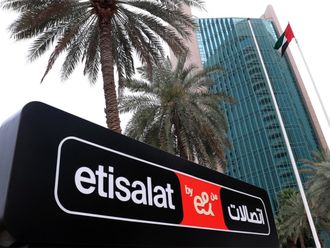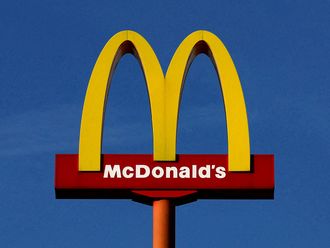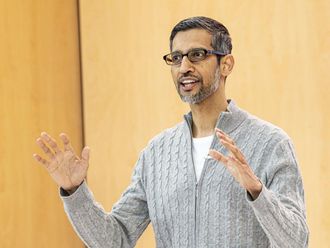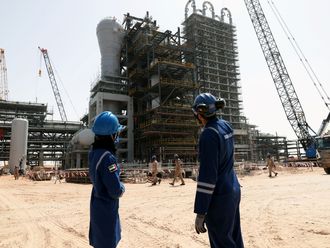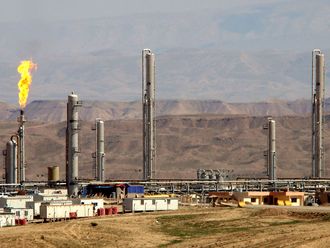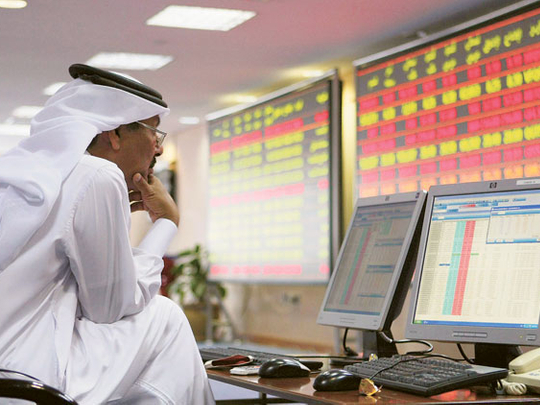
Just when the Eurozone is struggling to stay afloat, higher oil prices threaten to drag it below the waves again. General expectations are of either zero growth or outright recession again this year.
By now we are used to hearing that Europe's difficulties are drawing liquidity away from the Gulf, which will constrain growth in the region. You might think that those high oil prices, and exports, would translate into an abundance of funds, but it doesn't quite work like that, as discussed here last week.
The signs are that the feedback loop from oil prices to the European economy and back to the Gulf is already in action.
Kamram Butt, head of Mena Private Banking Equity research, Credit Suisse, says, "The ECB's long-term refinancing operations have reduced the tail risks affecting some GCC banks — notably in the UAE and Qatar."
But at the same time, "in fact, banks in both countries seem to be reducing their risk appetite. In the UAE banking sector credit has slowed even further. Elsewhere in the GCC, similar caution [is] emerging, due not only to uncertainty about the external economic environment, but also heightened regional, geopolitical risks."
Back in January a research note from Standard & Poor's advised "liquidity from foreign bank funding is likely to shrink somewhat because of the deleveraging and restructuring taking place in the West. That is a potentially negative consequence of the European crisis."
Speaking to Gulf News last month, however, S&P's chief economist Jean-Michel Six observed that developed countries' chronic dependence on easy money had a silver lining for the region.
"Interest rates in the developed world will remain negative in real terms," he predicted.
"The chase for yield should work in favour of GCC [debt] issuers."
In the latest regional report from EFG-Hermes, Monica Malek, chief economist, finds a different balancing item: "We assume virtually no European bank funding in Mena projects, and a continued drop in FDI … [but] we believe that GCC countries will be able to compensate for Eurozone lending, which was an important funding source [for their] investment programmes. With strong reserves, GCC countries are generally well placed to counterbalance a shock."
And of course that cushion is growing, courtesy of the energy markets. "We see the GCC in a substantially stronger external position as a result of a tightening in sanctions on Iran from the US and EU, despite the weak oil demand growth outlook," she continues.
Said Hirsh, Middle East economist at Capital Economics, points out that some countries will be more affected than others. The UAE has a particular exposure in terms of services exports, meaning that its non-oil sector "will bear the brunt of further deterioration in the Eurozone".
Evidently, you really can't keep oil prices out of the picture, and, for Europe, it might get worse.
In an ironic twist, "any periodic market tensions associated with euro weakness would risk pushing oil prices even further up," suggests Jarmo Kotilaine, chief economist at NCB Capital.
That would be a vicious circle to amplify the vortex the Eurozone finds itself tumbling in, and once again a double-edged sword for Gulf economic prospects.
Even so, those prospects remain relatively bright. "The EU crisis will have implications. However, on a comparative basis we believe the GCC's economic metrics will still trump global numbers, right behind BRIC nations," says Naveed Vakil, head of research at TAIB Securities, Bahrain (see chart).
It's an endorsement which only highlights the world of differences between the global blocs, interdependence notwithstanding.
Reforms needed
What's wrong with the euro? Well, if the foreign exchange markets are any guide, then maybe not very much. It's still worth $1.30, assuming the dollar remains a reasonable benchmark, although against gold and oil it doesn't look so clever.
So much political capital has been invested in it that the euro may now come with that ominous label "too big to fail". As to the economic capital, this weekend European finance ministers have been due to discuss a "firewall" fund of up to €1 trillion (Dh4.89 trillion). (After all, what's a trillion between friends?)
Last week, the OECD issued a report detailing what it believes is necessary to help secure the Eurozone, and ensure that good money isn't following bad.
"Ambitious structural reforms are needed," it intoned. "These should tackle product market regulation, labour market institutions, tax systems, and strengthen the Single Market. While the full gains take time to materialise, many reforms would boost activity even in the short run … including regulations that discourage investment and wage-setting mechanisms that weaken competitiveness."
The key word is "ambitious", because, frankly, much of the Eurozone doesn't have much of an appetite for that kind of change, though the situation is serious enough. Indeed, one central notion behind the EU is collectively to protect non-market structures, not to abandon them.



